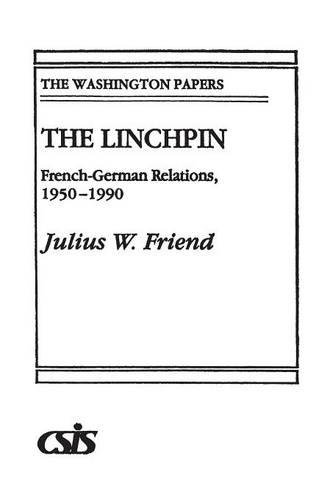
The Linchpin: French-German Relations, 1950-1990
(Paperback)
Available Formats
Publishing Details
The Linchpin: French-German Relations, 1950-1990
By (Author) Julius W. Friend
Bloomsbury Publishing PLC
Praeger Publishers Inc
31st December 1991
United States
Classifications
Tertiary Education
Non Fiction
European history
327.44043
Physical Properties
Paperback
160
Description
The rapprochment between France and the Federal Republic of Germany five years after the end of World War II was the cornerstone of all subsequent Western European history. Their previous hostility was a basis for arms races and wars - their friendship, the foundation for continually widening European economic and now political community. The unexpected reunification of Germany in 1990 sent shock waves through the French political class. Julius W. Friend explains the present French-German relationship, first investigating the recent past, then laying out the problems of the present and foreseeable future. Each chapter follows the history of the French-German relationship in the post-war period, covering the DeGaulle-Adenauer collaboration, the economic power of West Germany and its policy toward the East (and their effects on France), socialist governments in both countries, and French reactions toward the events of late 1989 in East Germany - and the initial reticence of the French to accept German reunification. The book concludes with the widely posed question of whether France is the big loser in regard to the recent events in Germany. Are France and Germany together still the "linchpin" of a stable Europe and the European Community Do the countries still need each other Friend's volume attempts to answer these and other intriguing questions, suggesting a European agenda for the next decade.
Reviews
"During a time of epochal change when many books are out of date upon publication, Juilus Friend's The Linchpin offers a concise and insightful perspective on the relationship that will be key to the shaping of the new Europe. Friend's elegant analysis reveals the fundamentals of the political, economic, and security aspects of the Franco-German partnership and prepares the reader to anticipate and understand what will follow the cold war in Europe."- Stephen F. Szabo Associate Dean for Academic Affairs The Nitze School of Advanced International Studies The Johns Hopkins University
"The prosperity and security of postwar Western Europe and the development of the European Community stem from the extraordinary transformation in relations between France and Germany. Julius Friend's study of the four decades from 1950 to 1990 provides a valuable history and analysis of this transformation, and it suggests the questions that Europe faces in the future as a result of the end of the cold war era and the unification of Germany."-Robert J. Lieber Professor and Chairman Department of Government Georgetown University
Author Bio
JULIUS W. FRIEND is chairman for area studies on Francophone Europe at the Foreign Service Institute in Arlington, Virginia. He has also taught European diplomatic history and comparative politics at The George Washington University and lectured on French politics at Johns Hopkins School of Advanced International Studies summer school. He retired in 1979 from the Central Intelligence Agency as senior analyst in European affairs. He is the author of Seven Years in France: Francois Mitterrand and the Unitendended Revolution (1989) and of numerous articles on the European Left in French Politics and Society, Studies in Comparative Communism, Problems of Communism, The Washington Quarterly, and Communisme (Paris).
